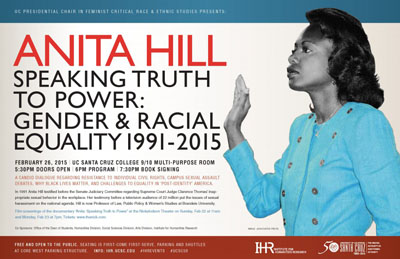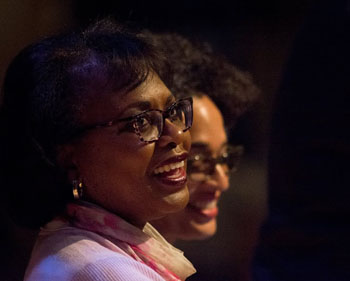Campus News
Anita Hill: ‘I hope my life is a living example of the power of coming forward’
Anita Hill, the focus of the highest-profile sexual harassment case in U.S. history, addressed a capacity crowd about “speaking truth to power.”


The standing-room crowd hissed and booed Thursday night when Supreme Court Justice Clarence Thomas’s name came up.
This was part of their welcome for Anita Hill, the focus of the highest-profile sexual harassment case in U.S. history.
Her Thursday night talk at UC Santa Cruz, “Speaking Truth to Power: Gender & Racial Equality 1991–2015,” had students and community members lined up for blocks more than an hour before she took the podium. An audience of 450 filled the College Nine/Ten Multipurpose Room, while another 300 people watched a live feed in the Humanities Lecture Hall.
When Hill appeared before a television audience of 22 million in 1991, accusing a U.S. Supreme Court Justice nominee of inappropriate sexual behavior, her life changed overnight. Her testimony took place in front of an all-white, all-male Senate subcommittee during Thomas’s confirmation hearings. Her statements set off a nationwide discussion involving sexual harassment on the job, race, and gender representation, but did not stop his confirmation.
During her lecture Hill said that the United States, nearly a quarter-century after the hearings, still has a ways to go when it comes to protecting the rights of sexual harassment victims.
But she added that greater awareness as well as ongoing “private conversations” about sexual harassment issues and gender equality put this generation in a greater position of strength. Two decades ago, “there were many women who didn’t even know sexual harassment was against the law … Sexual harassment was just life, something you just had to put up with … Boys will be boys, and, apparently, men will be boys, too.”
This increased awareness shows how the case continues to reverberate in the United States, she said.
Looking back to 1991, she pointed to newspaper columnists who complained of a lurid “sideshow” after Hill testified that Clarence Thomas “routinely discussed sex, routinely pressured me and other women for dates and discussed pornography in the workplace.”
But she said that so-called “public spectacle” raised the question, “How would it feel if we could go to work and not be taunted and assaulted? We are here today asking questions not only about what happened in 1991 but what happens in the lives of people every day.”
During her talk she dissected the case as well as its aftermath, including a poll that revealed most Americans took Thomas’s side over Hill’s. Hill said that the pivotal moment was Thomas’s statement that he was the victim of a “high-tech lynching.”
“There are people who have studied lynching and people who have experienced it through their family history,” Hill said. “There is no evidence of a lynching of an African-American taking place because he abused a black woman. That was a complete misappropriation of history.”
After an audience member asked what words of advice she would give to victims feeling some trepidation about seeking justice, she gave an answer that combined solidarity and hope with a call for greater action.
“I would just say I hope my life is a living example of the power of coming forward,” said Hill, now a Brandeis University professor of social policy, an activist, the author of two books, and the subject of a new high-profile documentary by an Academy Award-winning director.
She is not, in other words, a person who let a period of controversy waylay her for very long. But she added an important caveat to her statement. “You can speak the truth,” she said. “You can step up and survive.” But she stopped short of saying “come forward, you will feel better” in every case because “we cannot promise that every girl who is harassed or assaulted” will be protected and receive a fair adjudication of her case.
“We have to do our job as well,” Hill said. “We have to earn their confidence through our behavior. We cannot promise them everything, but we can promise them a system that works.”
The U.S. is not quite there yet, Hill said, “but I am firm believer” that this time is coming soon. “And I’m telling you, if I can be optimistic, I think many people can be optimistic.”
UC Santa Cruz distinguished professor Bettina Aptheker, UC Presidential Co-Chair of Feminist Critical Race & Ethnic Studies, was on hand to select questions from the audience; Hill was on campus at Aptheker’s invitation.
The talk, a UC Santa Cruz 50th anniversary event, was sponsored by the UC Presidential Chair in Feminist Critical Race & Ethnic Studies, the Dean of Students, the Humanities Division, the Social Sciences Division, the Arts Division, the Institute for Humanities Research, and Bookshop Santa Cruz.